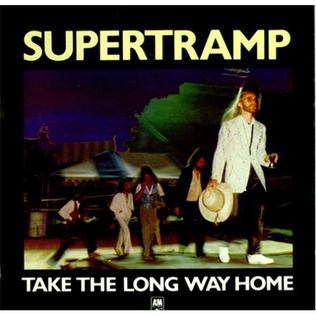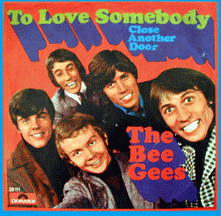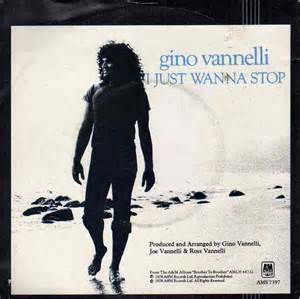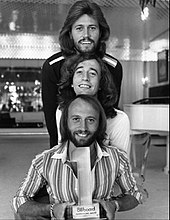
Gino Vannelli is a Canadian rock singer and songwriter who had several hit songs in the 1970s and 1980s. His best-known singles include "People Gotta Move" (1974), "I Just Wanna Stop" (1978), "Living Inside Myself" (1981) and "Wild Horses" (1987).

"Night Fever" is a song written and performed by the Bee Gees. It first appeared on the soundtrack to Saturday Night Fever on RSO Records. Producer Robert Stigwood wanted to call the film Saturday Night, but singer Robin Gibb expressed hesitation at the title. Stigwood liked the title Night Fever but was wary of marketing a movie with that name. The song bounded up the Billboard charts while the Bee Gees’ two previous hits from Saturday Night Fever soundtrack were still in the top ten. The record debuted on the Billboard Hot 100 Chart at #76, then leaped up 44 positions to #32. It then moved: 32–17–8–5–2–1. It remained at #1 for eight weeks, and ultimately spent 13 weeks in the top 10. For the first five weeks that "Night Fever" was at #1, "Stayin' Alive" was at #2. Also, for one week in March, Bee Gees related songs held five of the top positions on the Hot 100 chart, and four of the top five positions, with "Night Fever" at the top of the list. The B-side of "Night Fever" was a live version of "Down the Road" taken from the Bee Gees 1977 album, Here at Last... Bee Gees... Live.

"Stayin' Alive" is a song written and performed by the Bee Gees from the Saturday Night Fever motion picture soundtrack. The song was released in December 1977 by RSO Records as the second single from the Saturday Night Fever soundtrack. The band wrote the song and co-produced it with Albhy Galuten and Karl Richardson. It is one of the Bee Gees' signature songs. In 2004, "Stayin' Alive" was placed at No. 189 by Rolling Stone on their list of the 500 Greatest Songs of All Time. The 2021 updated Rolling Stone list of 500 Greatest Songs placed "Stayin' Alive" at No. 99. In 2004, it ranked No. 9 on AFI's 100 Years...100 Songs survey of top tunes in American cinema. In a UK television poll on ITV in December 2011 it was voted fifth in The Nation's Favourite Bee Gees Song.

"Nights on Broadway" is a song by the Bee Gees from the Main Course album released in 1975. The second single released from the album, it immediately followed their number-one hit "Jive Talkin'". This track was credited to Barry, Robin and Maurice Gibb.

"Jive Talkin'" is a song by the Bee Gees, released as a single in May 1975 by RSO Records. This was the lead single from the album Main Course. It hit number one on the Billboard Hot 100 and top-five on the UK Singles Chart in the middle of 1975. Largely recognised as the group's comeback song, it was their first US top-10 hit since "How Can You Mend a Broken Heart" (1971).

"Tragedy" is a song released by the Bee Gees, written by Barry, Robin & Maurice Gibb, included on their 1979 album Spirits Having Flown. The single reached number one in the UK in February 1979 and repeated the feat the following month on the US Billboard Hot 100. In 1998, it was covered by British pop group Steps, whose version also reached number one in the UK. In 2024, it was used in the film Beetlejuice Beetlejuice, as well as its trailer.

"You Should Be Dancing" is a song by the Bee Gees, from the album Children of the World, released in 1976. It hit No. 1 for one week on the American Billboard Hot 100, No. 1 for seven weeks on the US Hot Dance Club Play chart, and in September the same year, reached No. 5 on the UK Singles Chart. The song also peaked at No. 4 on the Billboard Soul chart. It was this song that first launched the Bee Gees into disco. It was also the only track from the group to top the dance chart.

"How Deep Is Your Love" is a ballad written and recorded by the Bee Gees in 1977 and released as a single in September of that year by RSO Records. It was ultimately used as part of the soundtrack to the film Saturday Night Fever. It was a number-three hit in the United Kingdom and Australia. In the United States, it topped the Billboard Hot 100 on 24 December 1977 and stayed in the Top 10 for 17 weeks. It spent six weeks atop the US adult contemporary chart. It is listed at No. 27 on Billboard's All Time Top 100. Alongside "Stayin' Alive" and "Night Fever", it is one of the group's three tracks on the list. The song was covered by Take That for their 1996 Greatest Hits album, reaching No. 1 on the UK Singles Chart for three weeks.
"If I Can't Have You" is a disco song written by the Bee Gees in 1977. The song initially appeared on the Saturday Night Fever soundtrack in a version by Yvonne Elliman, released in November 1977. The Bee Gees' own version appeared a month later as the B-side of "Stayin' Alive".

"Take the Long Way Home" is the third US single and sixth track of English rock band Supertramp's 1979 album Breakfast in America. It was the last song written for the album, being penned during the nine-month recording cycle. In 1980, the live version from Paris became a minor hit in various European countries.

"Babe" is a song by the American rock band Styx. It was the lead single from the band's 1979 triple-platinum album Cornerstone. The song was Styx's first, and only, US number-one single, spending two weeks at No. 1 in December 1979, serving as the penultimate number-one single of the 1970s. "Babe" also went to No. 9 on the Adult Contemporary chart. It additionally held the number-one spot for six weeks on the Canadian RPM national singles chart, charting in December 1979 and becoming the opening chart-topper of the 1980s. It was also the band's only UK Top 40 hit, peaking at No. 6. It also reached No. 1 in South Africa.

"To Love Somebody" is a song written by Barry and Robin Gibb. Produced by Robert Stigwood, it was the second single released by the Bee Gees from their international debut album, Bee Gees 1st, in 1967. The single reached No. 17 in the United States and No. 41 in the United Kingdom. The song's B-side was "Close Another Door". The single was reissued in 1980 on RSO Records with "How Can You Mend a Broken Heart" as its flipside. The song ranked at number 94 on NME magazine's "100 Best Tracks of the Sixties". The entry was a minor hit in France but reached the top 10 in Canada.

"Why Me" is a song written by Dennis DeYoung that was first released on Styx's 1979 double-platinum album Cornerstone. It was also released as the second single from the album, and reached #26 on the Billboard Hot 100 and #10 on the Canada RPM Top 100 Singles chart.

"Borrowed Time" is a song written by Dennis DeYoung and Tommy Shaw that was first released on Styx's 1979 album Cornerstone and was also released as the third single from Cornerstone. It peaked at No. 64 on the U.S. chart in April 1980.

"Show Me the Way" is a song by American rock band Styx, written by Dennis DeYoung and released as the second single from Edge of the Century. It peaked at number 3 on the Billboard Hot 100 chart in March 1991. The song's music video was directed by Michael Bay.

"More Than a Woman" is a song by musical group the Bee Gees, written by Barry, Robin, and Maurice Gibb for the soundtrack to the film Saturday Night Fever. It became a regular feature of the group's live sets from 1977 until Maurice Gibb's death in 2003 and was often coupled with "Night Fever".

Brother to Brother is the sixth studio album by Canadian singer Gino Vannelli. Despite its success - the biggest of Vannelli's career - it was also his last for A&M Records. The album was released in September 1978 and featured "I Just Wanna Stop", Vannelli's highest-charting single to date in both the US and Canada, where the single reached #4 and #1 respectively. Two other singles were released from the LP, "Wheels of Life", and "The River Must Flow".

"I Just Wanna Stop" is a song by Canadian singer/songwriter Gino Vannelli. Released as a single in August 1978, it remains his biggest hit single to date, reaching No. 1 in his native Canada and No. 4 on the U.S. Billboard Hot 100. It appears on his sixth album, Brother to Brother. The recording was produced by Gino and his brothers, Joe and Ross Vannelli; the song was written by Ross. It received a nomination for Grammy Award for Best Male Pop Vocal Performance.

"Wild Horses" is a song by Canadian singer-songwriter Gino Vannelli. Vannelli came up with the track's basis during a trip to Santa Fe, New Mexico, to meet a shaman. He co-wrote the lyrics with Roy Freeland and produced it with his brothers, Joe and Ross Vannelli. The song is about a man who promises never to leave his partner no matter what they experience together. It was included on Vannelli's ninth studio album, Big Dreamers Never Sleep, and released as its lead single in 1987.



















